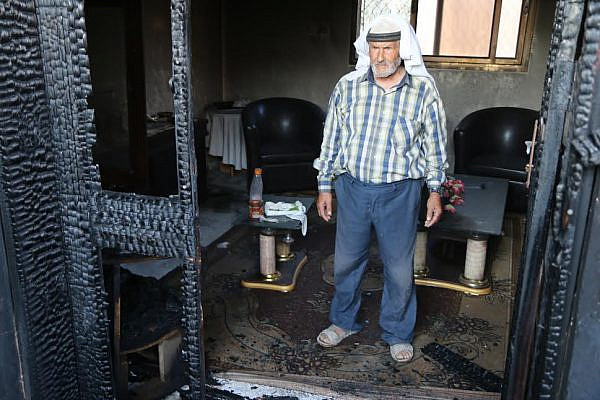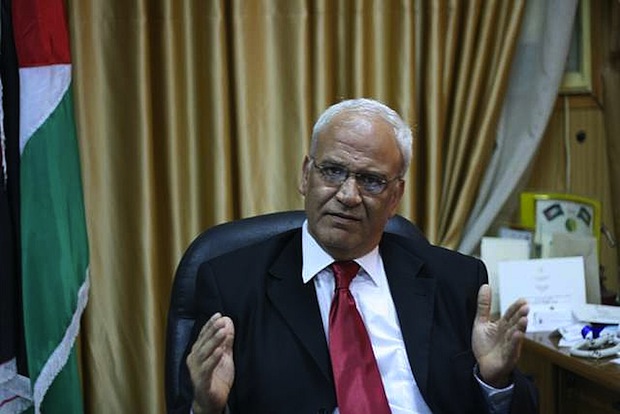The murder of a Palestinian baby has provoked condemnation from Israeli leaders across the political spectrum. Yet the harsh rhetoric masks a consistent failure by the Israeli establishment to understand the endemic nature of this kind of violence.

Friday morning’s “price tag” arson attack in the West Bank village of Duma, which killed Palestinian baby Ali Saad Dawabsha and left his parents and brother in critical condition, has been labeled an act of terror by nearly all Israeli and Palestinian politicians alike.
Prime Minister Benjamin Netanyahu called the arson “an act of terrorism in every respect,” and announced that he has put Israel’s security forces to work: “The State of Israel takes a strong line against terrorism regardless of who the perpetrators are.”
Culture Minister Miri Regev struck a similar tone: “Terror is terror, no matter from which side, Jewish or Arab.”
Meanwhile, Education Minister Naftali Bennett of the Jewish Home party declared: “This is not a ‘hate crime,’ nor ‘price tag.’ This is murder. Terror is terror is terror.” Justice Minister Ayelet Shaked, also of Jewish Home, also referred to terrorism and claimed that in an event such as this, “there is no Jewish or Arab, Left or Right,” just “a battle between the forces of light and darkness.”
The IDF, too, has adopted the same rhetoric as the politicians, labeling the arson an act of “Jewish terror.” IDF Spokesperson Peter Lerner, called the attack “a barbaric act of terrorism.”
Meanwhile Zionist Camp head Isaac Herzog took a slightly different tone. Although he went further in terms of calling for “leadership” and “soul-searching” in the wake of the murder, he stopped short of using the word terrorism, instead labeling it a “hate crime.”

It is rare for Israeli politicians to refer to price tag attacks as terrorism; generally, they are categorized as “hate crimes” or “nationalist crimes.” Frequently, the media frames such attacks as “graffiti,” often forgetting about damage to property or land, both of which are part and parcel of price tag attacks.
By and large, these responses sing from the same hymn sheet: all are big on condemnation, but most utterly fail to acknowledge the endemic nature of settler violence. Lacking, too, is any word on incitement by Israeli politicians. Bennett’s calls to annex the West Bank to Israel, coupled with his infamous statement about having personally killed many Arabs, sit rather awkwardly with his announcement this morning. Shaked, for her part, posted a notorious Facebook update during last summer’s Gaza war in which she called Palestinians “snakes” and suggested that Palestinian mothers and their houses “must go… Otherwise they will raise other little snakes there.”
The only statements from Jewish Israeli politicians that mention the government and army’s systemic failures in stemming Jewish terrorism have come from either Meretz or the Joint List.
In response to the murder, Meretz head Zehava Galon wrote that “the writing was on the wall” and criticized the right-wing leadership for being blind to the “direct line” between their failure to properly enforce the law in the West Bank and incidents such as last night’s lethal attack.
Read: Settler violence — it comes with the territory
Dov Khenin of the Joint List also indicated that the attack was inevitable and that the link between the arson and Thursday’s stabbing attack at the gay pride parade in Jerusalem is clear: both are the result of “hatred of the other, dehumanization and incitement that snowball into action.” He also called on the Right not to simply condemn and then wash its hands of responsibility.
Ahmed Tibi, also of the Joint List, wondered this morning whether Avigdor Liberman’s nationalist Yisrael Beiteinu still stood by their call to implement the death penalty for terrorists, satirically announcing that the houses of the settlers responsible for the arson would not be demolished by Israel.
The response of Israeli human rights NGO B’Tselem to the Duma arson was unequivocal regarding who is to blame: “[This event] was only a matter of time. It is due to the authorities’ policy of not enforcing the law against Israelis who attack Palestinians and their property.” Such immunity only encourages settler violence, the statement continues, before warning that another incident of this nature is on the horizon.
Saeb Erekat, chief negotiator for the State of Palestine, issued a statement in the same vein: “We hold the Israeli Government fully responsible for [last night’s events]. This is a direct consequence of decades of impunity given by the Israeli government to settler terrorism.” Palestinian Authority head Mahmoud Abbas has said that he will turn to the International Criminal Court to investigate the arson.
The US Department of State issued a strongly-worded statement Friday afternoon, condemning the “vicious terrorist attack in the Palestinian village of Douma.” The statement also extended condolences to the Dawabsha family and called on all sides to “maintain calm and avoid escalating tensions.”
Since 2004, around 11,000 incidents of settler violence against Palestinians have been recorded, according to the statement from the State of Palestine. Hundreds of “price tag” attacks occur each year, the majority of which go largely unreported and involve, inter alia, arson, looting, defacement, destruction of olive trees and other acts of vandalism, as well as physical attacks on Palestinians.
The scale of such attacks indicates the extent to which settler violence is part of the culture of the West Bank and not merely an issue of “bad apples.” The Yesha Council, an umbrella organization of municipal councils of West Bank settlements, posted a statement this morning that “[t]his is not the way of the residents of Judea and Samaria”; however, such condemnations are incredibly rare given the consistent nature of assaults by Israeli settlers.
The indictment rate for such crimes is also extremely low: Israeli human rights NGO Yesh Din has reported that a survey of Samaria and Judea District Police files investigating attacks against Palestinians and/or their property by Israeli civilians showed that between 2005 and 2014, only 7.4 percent of such cases ended with indictments. Furthermore, since the establishment of the Nationalistic Crimes Unit, tasked with investigating such crimes, the performance of the Israel Police’s SJ District has actually worsened.



